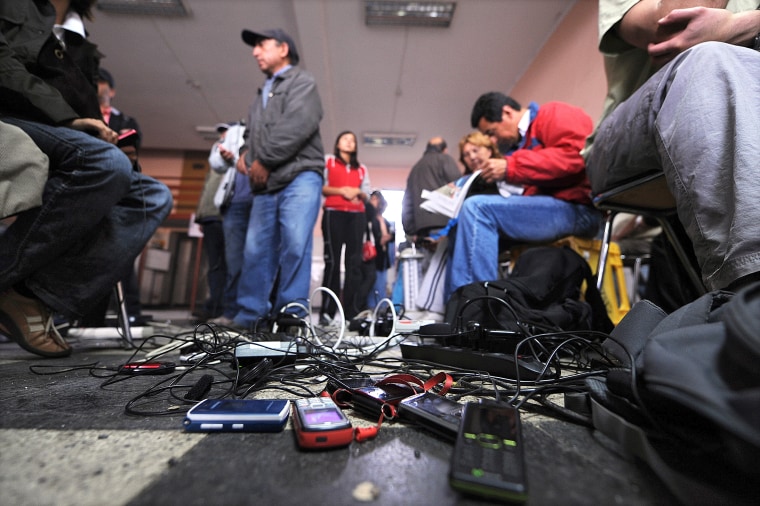The Chilean Red Cross is asking those who do have power and Internet service to share it with others following Saturday's 8.8-magnitude earthquake, which has left some with phone and Internet service, including wireless access to the Web.
"Share your Wi-fi with residents for them to inform and communicate," said the Chilean Red Cross on Twitter, the short-messaging blog which has been a key communications link for Chile since the quake struck Saturday.
Chile's communications infrastructure is much more technologically advanced than Haiti's, which suffered a near-total collapse as a result of the Jan. 12 earthquake there.
Still, "The country’s telecommunications have been badly hit, especially in Bio Bio and Maule, the two regions worst affected" near the quake's epicenter, said Lucia Bibolini, a senior researcher for BuddeComm, a global telecommunications research firm, in a report Sunday.
Maule, a region south of the capital Santiago, had the most confirmed deaths on Sunday: 541.
"Mobile telephony suffered less damage than fixed lines," Bibolini wrote. "In Iloca, a seaside resort close to the epicenter, a giant wave destroyed most of the town, but the people who managed to escape to a nearby hill were still able to phone on their mobiles."
Landline service out in certain areas
While Santiago, the nation's capital, and 200 miles north of the quake's epicenter, lost both electricity and telephone connectivity, "both light and communications were re-established within a few hours," Bibolini wrote.
"Fixed telephony appears to be the worst effected telecom sector by far, particularly in the cities of Concepcion, Constitution, Talcahuano, Chillan, and Curico, where the network is shattered."
Volunteers from the nonprofit group, Télécoms Sans Frontières (Telecommunications Without Borders), which also helped in Haiti after the Jan. 12 quake there, are on their way to Chile, Paul Paul Margie, U.S. representative for the nonprofit group told msnbc.com.
"Our reports are that communications are badly damaged in some areas, so we are sending an emergency telecom team" there, Margie said.
Twitter plays key role
Twitter has been a key resource for those in Chile since the quake struck. The short-messaging site, which limits posts to 140 characters each, can be accessed via cell phone as well as by computer. In Chile, 92 percent of the population has mobile phones, compared to 21 percent with landline phone service, according to BuddeComm.
"During the blackout in Santiago and other localities, the only means of communication was the 3G (wireless) network," Bibolini said. "Thus, iPhones and BlackBerrys played an important role. As in other emergencies elsewhere, Twitter became the only source of information for people trapped in the dark with no fixed phone, Internet, or television connection."
Almost immediately Saturday, Chileans using Twitter urged others to conserve and share energy and resources.
"Friends, free your wifi routers so neighbors can connect and communicate with their families," said one tweet from Chile.
"We have 5 phones charged, at night we do not know if power is cut, you also do it and buy candles or batteries for flashlight" was another.
And at about 5 p.m. ET Saturday came this tweet: "My wifi network is still open and available to connect the phone to people if someone requires it."
Bibolini said that Chile's three wireless operators — Entel, Claro, and Movistar — "suffered the collapse of several antennas. The government asked everyone to limit their use of mobile phones to avoid network overload which might hinder rescue efforts. People were advised to send text messages rather than talk.
"Movistar and Claro continued to function, except in some of the most seriously affected areas around Concepcion and further south. Entel, however, was still without a signal (Sunday) in Santiago and other parts of the country, and its Web site was still down. Reportedly, mobile voice services were unavailable for longer than mobile data services."
'Pioneer' for new technologies
Chile is "the most mature telecom market in Latin America, and the region’s pioneer when it comes to new technologies," according to a previous report by BuddeComm.
Almost 53 percent of Chile's population are Internet users, and about 10 percent of them rely on high-speed, or broadband, connections to get to the Web.
"The country is the regional leader in terms of Internet and broadband penetration," BuddeComm says.
The country was the first in Latin America with services such as mobile WiMax — considered to be a "4G," or fourth-generation wireless technology — as well as Internet Protocol TV which is used for time-shifted programming or video on demand.
An American Red Cross volunteer, based in Virginia and using Twitter to communicate, urged those in the United States trying to reached family and friends in Chile, to do so by text messages rather than voice calls. Text messaging is less of a strain on phone networks than voice calls.
"In general, during emergency situations, text messages will often go through quicker than voice calls because they require less network resources," said AT&T spokesman Steven Schwadron.
"During an emergency, more people are trying to use their phones at the same time. The increased calling volume may create network congestion, leading to 'fast busy' signals on wireless phone or a slow dial tone on your landline phone. If this happens, hang up, wait several seconds and then try the call again. This allows your original call data to clear the network before you try again."
